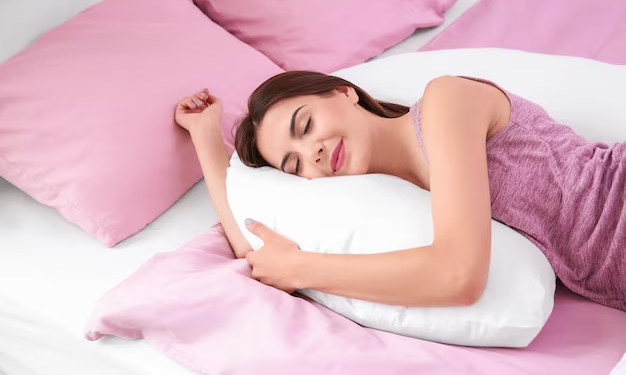Everybody has a favorite way to sleep, be it on their stomach, side, or back. For the best possible comfort and support, find the best pillow that fits your sleeping position. Now let’s look at some recommendations for selecting the body pillow for your preferred sleeping style:
1. Best pillow for neck pain and Back Sleepers

If you sleep on your back, you should choose a pillow that fits your head and neck’s natural curves well. Choose a medium-firm pillow to support your neck without forcing your head forward excessively. For back sleepers, memory foam pillows or those with a contoured shape can provide superior neck support and alignment.
2. The best pillow for side sleepers and pregnancy pillows

To preserve correct spinal alignment, side sleepers need a pregnancy pillow that bridges the space between their ears and shoulders. For side sleepers, a firm, lofty pillow that maintains the head at shoulder level is ideal. Because they provide superior support and keep the head from sinking too far into the pillow, memory foam or latex pillows are frequently suitable for this sleeping position.
3. Stomach Sleepers and neck pillows

A softer, thinner pillow is necessary for stomach sleepers to prevent neck and spine strain. Choose a pillow that is low-profile and soft to avoid having your head elevated excessively. Stomach sleepers tend to favor down or down substitute pillows because they offer gentle support that still permits the head to rest comfortably.
The right pillow guarantees a restful night’s sleep. Keep in mind that selecting a pillow that suits your particular sleep style is crucial. But there are other things to think about besides pillow types and sleeping positions.
The Role of Best Pillow Fillings in Providing Support and Comfort
The general feel, support, and longevity of your pillow are directly influenced by the filling material. Let’s examine a few common pillow fillings and their attributes:
1. Polyester Fiberfill
Polyester fiber fill, sometimes called synthetic or microfiber fill, is a typical filler used in pillows. A common way to say that these pillows are lightweight, reasonably priced, and hypoallergenic. Although polyester pillows are soft and luxurious, they can become flat and lose shape over time, necessitating frequent fluffing and replacement.
2. Blending Down and Feathering
An opulent and comforting pillow option is available with a down and feather combination. A balance of comfort and support is provided by the combination of firmer feathers and soft down. These pillows can be inflated to the appropriate loft and have a tendency to last longer than pure down pillows. They might not be appropriate, though, for people who have allergies or sensitivity issues.
3. Foam Memory
As we previously mentioned, memory foam pillows are composed of a viscoelastic material that conforms to the shape of your body. For those who suffer from neck or back pain, they are especially helpful because they provide superior support and pressure relief. Memory foam cushions are renowned for their long-lasting nature and capacity to hold their shape.
4. Latex from nature
The sap of rubber trees is used to make natural latex pillows, which have great support and longevity. They feel responsive and bouncy, fitting your head and neck perfectly while offering a buoyant surface. Cushions made of latex are naturally hypoallergenic and mold- and dust-mite-resistant.
Choosing the correct pillow requires careful consideration of your preferences as well as any unique requirements or medical conditions.
Taking into Consideration Special Needs and Health Conditions for My Pillow Selection

Selecting a pillow that meets your specific needs is crucial if you have any medical conditions or special needs. Here are a few examples you should think about:
1. Sensitivities or allergies
Hypoallergenic pillows, which are resistant to allergens like mold and dust mites, are the best choice for people with allergies or sensitivities. Pillows made of latex, memory foam, or synthetic fill are frequently hypoallergenic.
2. Sleep apnea or snoring:
Pillows that encourage correct head alignment and elevation can help reduce the symptoms of sleep apnea and snoring. It may be helpful to use pillows with contouring and adjustable features that support the neck and maintain open airways.
3. Acid Reflux or GERD
If you suffer from acid reflux or gastroesophageal reflux disease (GERD), elevating your upper body can reduce symptoms. Wedge pillows or pillows with adjustable height can assist in maintaining an inclined position while you sleep.
if you want to read about how a Mediterranean diet can help reduce belly fat and weight loss



